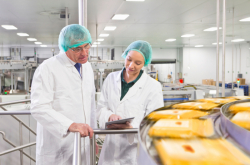The FoodTech market will change not only due to increase in population, but also due to the changes in people's lifestyle. This calls for new diets that help one cope with an inactive lifestyle. Also, individual diets developed by specialists are becoming more and more popular.
Also, new problems emerge — some don't really have to do with consumers. Manufacturers face the necessity to develop new technologies for storing food, and this leads to changes in logistics and initiates new research: how to introduce new packages that allows to retain the product's quality? How to change the product's structure for that?
As of now, about 30% of the Earth's populace works in fields related to the Food Industry. The development of automation may lead to people losing their jobs. Meanwhile, the demand for new, highly qualified personnel will rise — those who'll be able to cope with the changing environment and create new innovative products.
There also will be a lot of work for environmental engineers. Agricultural projects greatly affect the environment, polluting soil, water and air. About a third of Russia's crops spoil before reaching the consumer. And that means misused fertilizers, croplands and labour.

"There are different forecasts on how we will feed ourselves in 35 years. There are even the futuristic ideas to eati out of tubes. Still, even now we have to think about new alternative approaches to the food industry, genetic research and a more caring attitude to our resources. Do we have the technologies necessary for solving the problems of the FoodTech market, the relevant legislation and personnel? Unfortunately, there are still more questions than answers to that", — shared Ekaterina Egorina, head of ITMO's Marketing Department.
The foresight-session's participants split the problems of the food industry into four groups: those that have to do with the state, consumer, production and science. For each group they defined the main tasks that are to be solved in the nearest future, and proposed solutions to them. These proposals will be then sent to the National Technology Initiative's workgroup for this market.
Foodtech and the state
Despite all the governmental measures for supporting the food industry, the legislation sometimes interferes with its development. That creates administrative obstacles. Also, the rules to working on the food market differ from region to region. The manufacturers often find it hard to get the information necessary to legally develop their business, as well as one that has to do with governmental support programs.
Foodtech and the consumer
The main concern of the consumer is the quality of the products. Unfortunately, not all products have verifiable markings, and the ingredients description may be false. Despite the growing popularity of healthy foods, people don't know much about sensible nutrition. The Media does not help solve the problem — what's more, they sometimes create an unjustified negative attitude towards particular products. To solve this problem, it is necessary to teach people food culture from childhood. Also, experts noted that it is impermissible to throw out expired products, as well as eliminate embargo list production. Special centers shall be organized instead, where these products shall be brought to be distributed between social institutions or sold at discount prices.

Foodtech and production
Foodtech and science
The session's participants brought up the problem of the lacking funding for research in the field of food industry. The main problem is low popularity of FoodTech and absence of sufficient understanding of the importance of the food industry in Russia. This results in brain drain. Also, outdated legislation interrupts with introducing innovations. Universities have to become more open towards manufacturers, as well.
We've asked the session's participants about the problems that emerge when introducing innovations into production and the interactions between universities and establishments.
"Surely, introducing innovations is an essential problem for any manufacturing establishment. The other question is whether universities are interested in cooperating with establishments, and to what extent? Sometimes students and staff from universities cooperate with an establishment on some project, but the results are not introduced due to their interest diminishing", commented Svetlana Davidenko, leading biochemist of the Baltica Breweries.

"For dairy manufacturers, especially those that use natural products, introducing scientific inventions is not a pressing problem, but we are still open to cooperation with universities. Pasteurization, the use of ferments — these technologies that are now common were novelties once. Still, the main problem is that we don't have any well-established ties with universities — the manufacturers don't get the information on what this or that university can offer", shared Valeria Ivanova, head of "Losevo" corporate group's PR department.

"Our facilities have been equipped with the most modern equipment, and our main goal now is to retain the high quality of our products. So we introduce new solutions to functional food products. Now, we are working on developing special dairy products for sportsmen. The main problem here is the lack of raw materials, as there are only a few farming enterprises left in the Leningrad Region", — noted Vladimir Filonenko, head of "Galaktika" LLC.
"Problems related to procurement and economy are most essential in the food industry. That is why the byproducts have to be processed into something with high added value, not thrown out or fed to livestock. For instance, fish runoffs are rich in protein", shared Denis Baranenko, head of ITMO's "Biotechnologies of the Third Millennium" International Research Centre.
As of now, there is a mini-bakery, a mini-brewery, a laboratory for dairy products and a meat processing shop at ITMO university. The university conducts research on biologies for prolonging cold preservation of fruits and vegetables, chemicals to replace noxious pesticides used in agriculture, and bioactive ingredients that can be used as additives for preventive therapy of different diseases.






